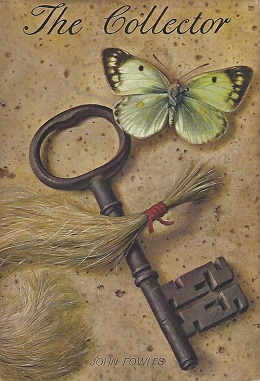The Collector, John Fowles
In this novel, an asocial man obsessed with butterfly collecting kidnaps Miranda, the object of his desire, and keeps her locked away, justifying his actions all the while. The book has been associated with several serial killers, including Leonard Lake, who was obsessed with the book and kidnapped, tortured, and killed women, calling the plot “Operation Miranda” after Fowles’ character
=========================================================
=========================================================
 |
[edit]Plot summary
The novel is about a lonely young man, Frederick Clegg, who works as a clerk in a city hall, and collects butterflies in his spare time. The first part of the novel tells the story from his point of view.
Clegg is obsessed with Miranda Grey, a middle-class art student at the Slade School of Fine Art. He admires her from a distance, but is unable to make any contact with her because of his nonexistent social skills. One day, he wins a large prize in the British football pools. This makes it possible for him to stop working and buy an isolated house in the countryside. He feels lonely, however, and wants to be with Miranda. Unable to make any normal contact, Clegg decides to add her to his "collection" of pretty, petrified objects, in the hope that if he keeps her captive long enough, she will grow to love him. After careful preparations, he kidnaps Miranda by drugging her with chloroform and locks her up in the cellar of his house. He is convinced that Miranda will start to love him after some time. However, when she wakes up, she confronts him with his actions. Clegg is embarrassed, and promises to let her go after a month. He promises to show her "every respect", pledging not to sexually molest her and to shower her with gifts and the comforts of home, on one condition: she can't leave the cellar.
Clegg rationalizes every step of his plan in cold, emotionless language; he seems truly incapable of relating to other human beings and sharing real intimacy with them. He takes great pains to appear normal, however, and is greatly offended at the suggestion that his motives are anything but reasonable and genuine.
The second part of the novel is narrated by Miranda in the form of fragments from a diary that she keeps during her captivity. Clegg scares her, and she does not understand him in the beginning. Miranda reminisces over her previous life throughout this section of the novel, and many of her diary entries are written either to her sister, or to a man named G.P., whom she respected and admired as an artist. Miranda reveals that G.P. ultimately fell in love with her, and subsequently severed all contact with her. Through Miranda's confined reflections, Fowles discusses a number of philosophical issues, such as the nature of art, humanity andGod.
At first, Miranda thinks that Clegg has sexual motives for abducting her, but as his true character begins to be revealed, she realises that this is not true. She starts to have some pity for her captor, comparing him to Caliban in Shakespeare's play The Tempest because of his hopeless obsession with her. Clegg tells Miranda that his first name is Ferdinand (eventual winner of Miranda's affections in The Tempest).
Miranda tries to escape several times, but Clegg is always able to stop her. She also tries to seduce him in order to convince him to let her go. The only result is that he becomes confused and angry. When Clegg keeps refusing to let her go, she starts to fantasize about killing him. After a failed attempt at doing so, Miranda passes through a phase of self-loathing, and decides that to kill Clegg would lower her to his level. As such, she then refrains from any further attempts to do so. Before she can try to escape again, she becomes seriously ill and dies.
The third part of the novel is again narrated by Clegg. At first, he wants to commit suicide after he learns of Miranda's death, but after he reads in her diary that she never loved him, he decides that he is not responsible and is better off without her. Finally, he starts to plan the kidnapping of another girl.
[]Fowles' own explanation of the purpose behind The Collector
Fowles explained in his follow-up book The Aristos, that the main point behind the novel was to show what he felt to be the danger of class and intellectual divisions in a society where prosperity for the majority was becoming more widespread, particularly power (whether by wealth or position) getting into the hands of those intellectually unsuited to handle it.

No comments:
Post a Comment